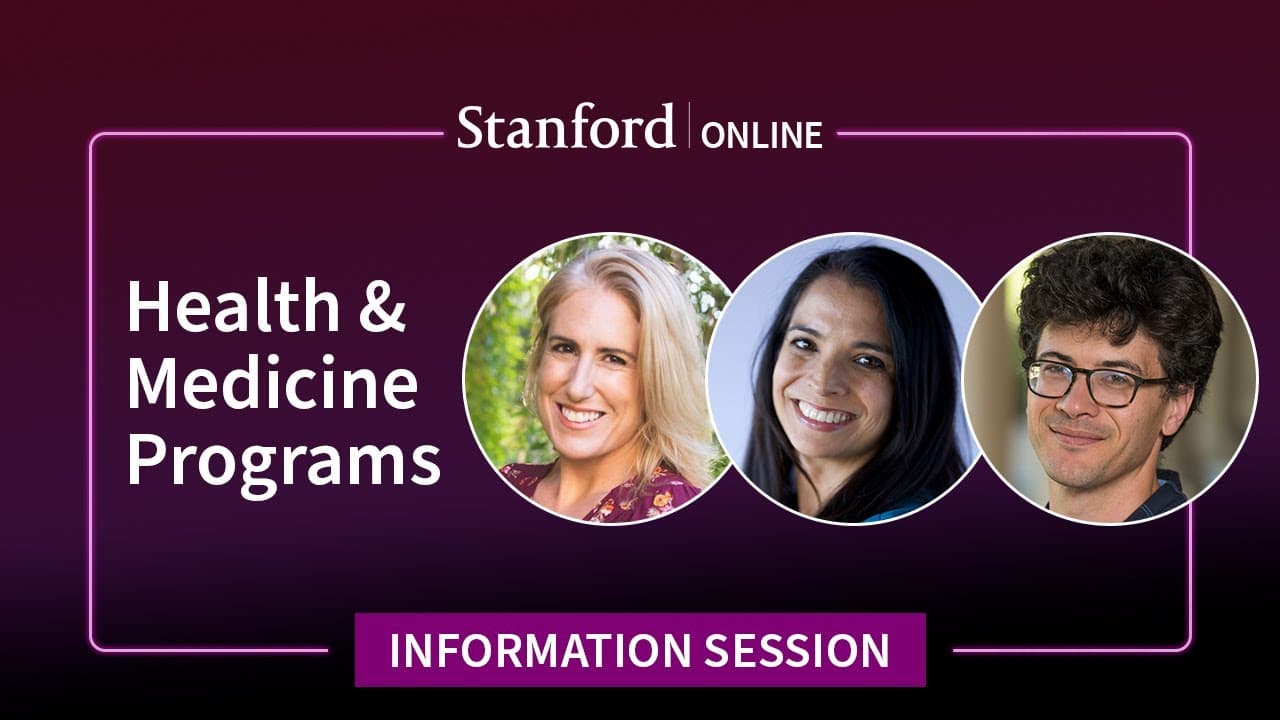Stanford Webinar - Health and Medicine Online Programs Information Session
20 Aug 2024 (over 1 year ago)

Center for Health Education Overview
- The Center for Health Education aims to provide global access to health education, enhance public health literacy, and improve health outcomes. (20s)
- The Center for Health Education offers a range of learning experiences, including free on-demand rapid learning, professional certificate programs, and online graduate certificates and master's degrees. (2m48s)
- The organization offers courses in three main areas: the future of health, medicine, and data science; health and wellness; and management and leadership. (33s)
Advanced Program in Health and Medicine
- The Advanced Program in Health and Medicine offers eight courses that provide up-to-date information on cutting-edge research and technologies in the health and medicine industries. (6m29s)
- The program is taught by Stanford professors and industry experts. (6m22s)
- The program is self-paced, and students who complete at least five of the eight courses earn a certificate of achievement. (6m41s)
- The deadline for the fall quarter is September 8th. (12m1s)
Online Credit-Bearing Courses and Graduate Programs
- Students enrolled in credit-bearing courses receive a Stanford transcript and complete the same assignments as on-campus students. (12m55s)
- Students in online credit-bearing courses receive Stanford login credentials, submit assignments online, participate in online forums, attend online office hours, and can live stream or watch recordings of lectures. (13m24s)
- This program is designed for individuals who are interested in graduate-level education but may not be ready for a master's degree. (17m21s)
- Students have the flexibility to choose the number and timing of courses, allowing them to tailor their learning experience. (17m29s)
- The program offers individual courses, graduate certificates (requiring 3-5 courses), and a master's degree in biomedical data science. (18m2s), (18m36s), (21m28s)
Graduate Certificate Programs
- The Epidemiology certificate program centers around the core requirements of the Epidemiology master's degree at Stanford. Required courses include biostatistics and clinical trial design, clinical research methods, and an elective. (22m24s)
- Graduate-level courses that appear on a Stanford transcript can be found by filtering the course catalog by "academic transcript". (27m33s)
- Graduate certificate coursework must be completed within 2-3 years, while a part-time master's degree allows 3-5 years. (28m46s)
- The cost of graduate certificates varies depending on the number of units required, with tuition at $1,514 per unit. (29m14s)
Biomedical Data Science
- Biomedical data science merges several disciplines, including biomedical informatics, computer science, biostatistics, and artificial intelligence. It applies these disciplines to a wide range of medical data, such as medical imaging, electronic health records, and tissue analysis. (23m23s)
Application Process and Important Dates
- The fall enrollment period for credit-bearing courses closes on September 8th. The application process requires a statement of purpose, educational and professional background information, official transcripts, residency documents, and a passport page. (24m58s)
Non-Degree Programs and Master's Degree
- There is no special pathway or shortcut from non-degree programs to master's degrees at Stanford. (33m5s)
- Up to 18 units completed in a non-degree program can be applied towards a master's degree. (33m42s)